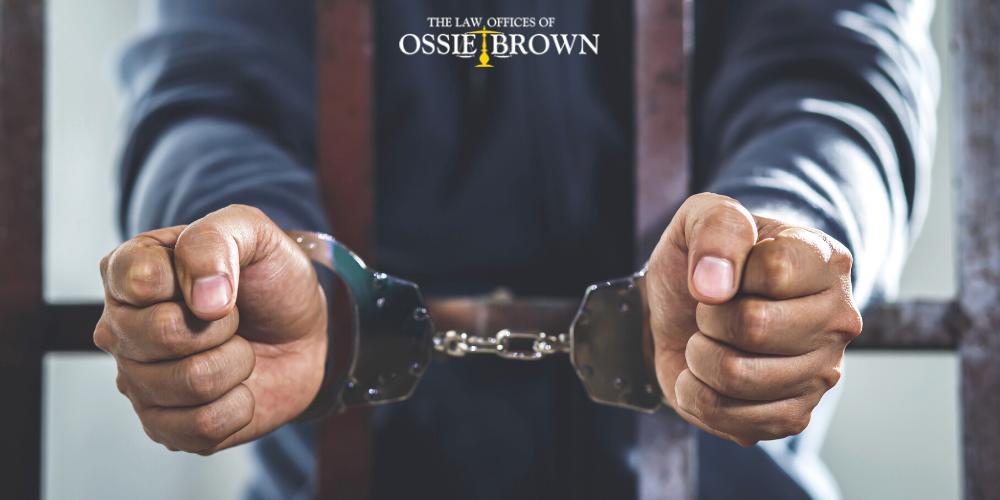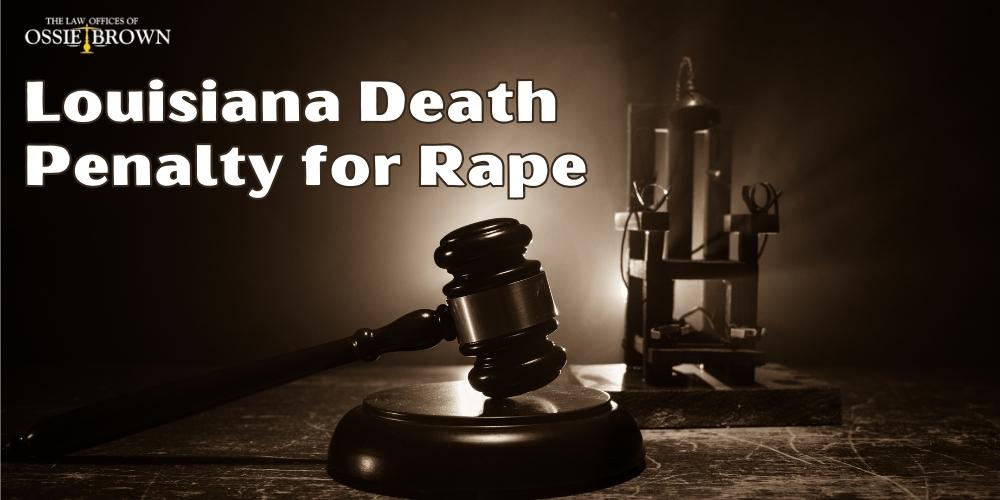For decades, lawmakers and American citizens have gone back and forth on whether the death penalty qualifies as one of many cruel and unusual punishments deemed unconstitutional by the Eighth Amendment of the U.S. Constitution. So much so, that the death penalty has been suspended and reinstated several times, with some states banning capital punishment altogether.
The issue becomes even more complex in reference to crimes involving the rape of a child. The death penalty for rape of an adult or child – that did not result in the victim’s death – is deemed as cruel and unusual punishment under the Eighth Amendment. This decision was made thanks to two different criminal court cases: Coker v. Georgia and Kennedy v. Louisiana.
Below, we explain the complex and controversial history of the death penalty, as well as the specifics on why the Eighth Amendment bars Louisiana (and all other states) from pursuing a death sentence for child rape.
If you have been arrested or charged for the rape of a child or adult under Louisiana rape law, you have a legal right to hire strong legal representation. Our Baton Rouge sex crimes lawyers can help you obtain the best possible case outcome. Call 225-343-1111 to schedule a free consultation with our team today.
What is the Death Penalty?
The death penalty – also known as capital punishment – occurs when a criminal is sentenced to death by lethal injection, electric chair, hanging, gas chamber, firing squad, etc.
Famous Death Penalty Cases
The history of the death penalty in the United States is very lengthy and complex due to political, legal, and moral issues. However, we will explain the brief cliff notes of the history of death penalty statutes in the U.S.
Pre-Furman History
The death penalty dates back all the way to the 1600s in early colonial Virginia. The first person who ever received a death sentence in recorded history was Captain George Kendall in 1608. He was killed by a firing squad after spying for the benefit of the Spanish government. Another common type of capital punishment back in these days was hangings.
“Cruel and Unusual Punishment”
The creation of the Bill of Rights in 1791 had a large impact on death sentences – and still does to this day. The amendment most commonly referenced in debates regarding the death penalty is the Eighth Amendment, which states:
“Excessive bail shall not be required, nor excessive fines imposed, nor cruel and unusual punishments inflicted.”
Two other amendments that are sometimes used in reference to the death penalty are the Fifth and Fourteenth Amendments. The Fifth Amendment mandates that all criminals receive a grand jury indictment for a capital crime. It also states that no one should “be deprived of life, liberty, or property” without due process of law. The Fourteenth Amendment also states that citizens can’t be deprived of life without due process of law.
1972: Death Penalty Suspension
Furman v. Georgia changed everything regarding the death penalty in the United States. The criminal case led to a 5-4 decision in which the U.S. Supreme Court invalidated all legal constructions of the death penalty. In other words, the Supreme Court ruled that following through with a death sentence in the U.S. violated both the Eighth and Fourteenth Amendments. Additionally, many Supreme Court justices – and Americans – claimed that there was significant racial discrimination surrounding the death penalty.
The last person to be executed before this landmark decision was Luis Monge in 1967. He was executed by the gas chamber.
1976: Death Penalty Reinstated
In 1976, more than half of Americans still actively supported capital punishment for violent criminals. The Supreme Court reinstated the death penalty “under a model of guided discretion” so as to not violate the Eighth and Fourteenth Amendments.
Gregg v. Georgia was the driving force behind the reinstatement of capital punishment in the United States. With this case, the Supreme Court decided that moving forward, two main things must occur in capital sentencing procedures so that the Eighth and Fourteenth Amendments are not violated:
- First Proceeding: The jury must decide whether the criminal is innocent or guilty. If the criminal is innocent or not convicted of intentional first-degree murder, then the criminal will not receive a death sentence.
- Second Proceeding: The jury must discuss all aggravating and mitigating factors before deciding on the death penalty or life in prison.
Gary Gilmore was the first criminal to be executed – in January 1977 – after the reinstatement of the death penalty. He is famous for demanding his death sentence after murdering two people in Utah in 1976. He was executed by a firing squad.
Recent Executions
In 2003, the Supreme Court halted the death penalty again (on a federal level, not a state level) over the fact that the three drugs used in lethal injection may not completely ensure unconsciousness. Therefore, it was argued that this method of execution may be considered “cruel and unusual punishment.”
In 2019, Attorney General William Barr ordered that the federal death penalty be reinstated again. He said: “We owe it to the victims and their families to carry forward the sentence imposed by our justice system.” Shortly after this reinstatement, Barr scheduled 5 execution dates. The first federal execution after 16 years was Daniel Lewis Lee in July 2020.
How Many States Have the Death Penalty?
Only 27 U.S. states enforce the death penalty – while 23 don’t – according to the Death Penalty Information Center. Louisiana is one of the 27 states that still enforce the death penalty for the most serious crimes.
How Many Criminals Have Died From the Death Penalty?
Since the 1970s – when the Supreme Court held that capital punishment is constitutional “under a model of guided discretion” – 1,566 criminals have been executed, according to data from the Death Penalty Information Center. Most of these executions occurred in southern states before the turn of the 21st century. In fact, less than 400 of those 1,566 executions occurred after the year 2000.

What Crimes Get the Death Penalty in the United States
According to the Death Penalty Information Center, capital punishment is only reserved for the most serious crimes, including:
Death resulting from:
- bringing in and/or sheltering illegal aliens
- the destruction of planes, cars, or buildings
- civil rights crimes
- crimes that involve explosives, transportation, government property destruction, or foreign/interstate commerce property destruction
- a carjacking
- terrorist attacks on railroad carriers or mass transportation vehicles
- any acts of terrorism in the U.S.
- violent conduct during child sex trafficking, child pornography, or other criminal sexual activity
- use of a weapon of mass destruction (nuclear, radiological, chemical, or biological device)
- aircraft piracy
- torture committed outside the U.S. by a U.S. national or foreign national
It also applies to the following:
- Intentional first-degree murder
- Murder that occurs during a drive-by shooting related to drugs
- Murder that occurs at an airport
- Espionage
- Genocide
- Treason
- Murder committed with a gun during violent drug trafficking crimes
- Murder that occurs in a federal government building
- Murder of a President, Vice President, presidential staff member, Congress member, Supreme Court Justice, federal judge, federal law enforcement member, foreign official, court officer, juror, or U.S. national in a foreign country
- Murder committed by a federal prisoner, especially one who is already facing life imprisonment
- A kidnapping or hostage situation that results in death
- Murder that occurs with the intent of preventing a witness or victim from testifying
- Any murder-for-hire situation that involves the use of interstate commerce facilities
- Murder that occurs as part of racketeering activities
- Murder that occurs during a bank robbery or a bank-robbery-kidnapping situation
- Murder that occurs during crimes against maritime navigation
Contact our Baton Rouge violent crimes lawyers to learn more.
Can You Get the Death Penalty for Rape in Louisiana?
In short, no. The Louisiana Supreme Court ruled that the death penalty is not a proportional punishment for child sexual assault, especially if it doesn’t result in the victim’s death. This landmark decision was made during the Kennedy v. Louisiana criminal court case.
The Georgia state Supreme Court affirmed the death penalty as a violation of the Eighth Amendment for adult rape as well. This landmark decision was made in 1977 in the criminal court case Coker v. Georgia.
Kennedy v. Louisiana
Patrick Kennedy received a death sentence after raping his eight-year-old stepdaughter in March 1998. Kennedy refused to plead guilty (even if pleading guilty would possibly spare him from capital punishment) and claimed that the child rape was committed by two neighborhood boys. In 2003, Kennedy was convicted of aggravated rape of a child under the age of 12 years old. He remained on Louisiana’s death row until the Louisiana Supreme Court ruled the death penalty disproportionate to his crime in 2008.
The reason why Patrick Kennedy faced the death penalty for child rape in the first place is that the aggravated rape was very violent, necessitating emergency reconstructive surgery in order to repair the injuries of his eight-year-old stepdaughter.
The Louisiana Supreme Court affirmed that Patrick Kennedy should face the death penalty for child rape because the U.S. Supreme Court previously only struck down the penalty for adults with Coker v. Georgia in 1977. In other words, U.S. law still permitted capital punishment for child rape cases, especially in cases in which the perpetrator had a previous rape conviction.
So, the Louisiana high court used a balancing test – previously used in Roper v. Simmons and Atkins v. Virginia. The first test determined whether there was a “national consensus” on the capital punishment for child rape. The second test determined whether the court would find the death penalty for child rape as an excessive punishment. In the end, the Louisiana Supreme Court found that similar laws in 5 other states and the pure vulnerability of child victims warranted capital punishment.
Kennedy sought certiorari by arguing that similar laws in 5 other states don’t equate to a “national consensus.” He also claimed that the decision of Coker v. Georgia should apply to both adult and child rape and that it was unfairly applied in order to single out black child rapists for the death penalty at a much higher rate than white child rapists.
In the end, Kennedy v. Louisiana concluded with a 5-4 decision that, yes, state law violates the Eighth Amendment by allowing the death penalty for the rape of a child, especially if the child victim did not die.
Sentence for Rape in Louisiana
Louisiana law does still enforce severe consequences when prosecuting child rape cases. In aggravated child rape cases that do not take the victim’s life, perpetrators can face life behind bars at hard labor without the possibility of parole (RS 14:42).
The penalty for second-degree rape – also known as forcible rape – includes 5 to 40 years in prison at hard labor. And finally, the penalty for third-degree rape (simple rape) is maximum 25 years in jail with hard labor.

Baton Rouge Sex Crimes Lawyers
If you are facing charges for sex crimes such as aggravated rape, forcible rape, simple rape, or sexual battery, you have a legal right to hire strong legal representation. Our Baton Rouge criminal defense lawyers have been helping their clients receive the best possible case outcomes – decreased fines, sentences, and charges – since 1984. We have the skill and experience necessary to do the same for you. Call our legal team at 225-343-1111 to schedule a free consultation today.


